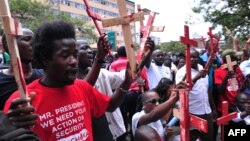Kenya has withdrawn recognition of about 500 non-governmental organizations working in the country, some for alleged links to terrorism. The decision comes as Kenya seeks to tighten security following recent attacks blamed on Islamist militants.
The crackdown on NGOs may also be related to their relationship with the International Criminal Court and cases against Kenya's president and his deputy.
Kenya's Non-Governmental Organizations Coordination Board has accused 15 organizations of financing terror and criminal activities in the country and in the Horn of Africa.
Speaking to reporters in Nairobi, the board's executive director, Fazul Mahamed, said bank accounts of some 500 civil society groups have been frozen, permits of foreign workers revoked, and some face possible prosecution.
"In collaboration with the security agencies, both locally and internationally, the board has identified these NGO's, their collaborators, sources of funding and their activities. The board has with immediate effect de-registered these organizations, frozen their bank accounts and forwarded information about them to the relevant government security agencies for appropriate action," he said.
Re-distributing assets
Mahamed said the coordination board will be distributing the frozen money to other NGOs that have permission to operate in the country.
"We have frozen their bank accounts immediately and now we are in the process of repossessing their assets with a view of redistributing the same to other NGOs pursuing similar charitable objectives," said Mahamed.
Last year, Kenyan lawmakers introduced a bill which sought to restrict the amount of funding NGOs can get from foreign sources to just 15 percent.
In the last few months many NGOs in Kenya have found themselves under increased scrutiny due to an uneasy relationship with the government over the cases at the International Criminal Court in The Hague involving Kenyan President Uhuru Kenyatta and his Deputy William Ruto.
The two men faced charges of crimes against humanity for allegedly helping orchestrate post-election violence seven years ago that left more than 1,000 Kenyans dead.
ICC maneuvers
The frosty relationship between Kenya's government and civil society organizations was on display last week at a New York meeting of the Assembly of State Parties, which is the management oversight and legislative body for the ICC.
The group Kenyans for Peace with Truth and Justice (KPTJ) circulated a flyer titled “Kenya’s 7-Step Formula for Impunity." Kenyan media reports the behavior of some NGOs, including KPTJ, angered the government officials and council of elders representatives present at the meeting.
Politicians allied to Kenyatta and his deputy have accused some lobbying groups of colluding with the ICC to persuade witnesses to testify against Kenyatta and Ruto.
Earlier this month, ICC prosecutor Fatou Bensouda dropped the charges against Kenyatta citing a lack of evidence, and lack of cooperation from the Kenyan government to provide key documents to the prosecution.




